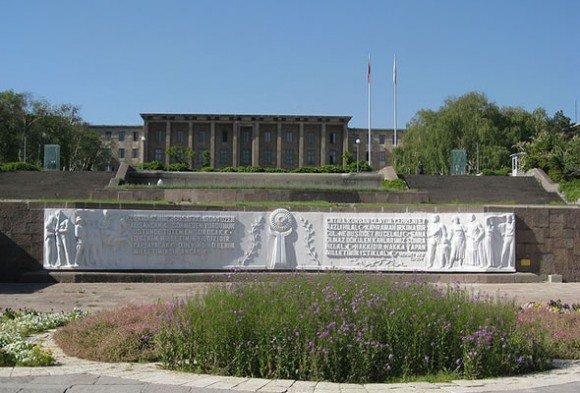
Turkey’s upcoming general election will be held on 12th of June 2011. AKP (Development and Justice Party) established two governments since 2002, and is the ruling party since then.
Despite the claims of the ruling party, the country is facing hard times. Poverty, unemployment, Kurt issue, abridgment of freedom of speech, decadence and indecency in politics, led Turkey into a deep crisis, but the ruling party is pressuring the citizens with the claim of stability.
The main principles of Turkish constitiution, that Turkey is a secular and democratic republic, is at stake since many people are afraid of the secularism of Turkey is in danger. In the spring of 2007, millions who shared the concern that Turkey’s politics are getting conservative, rallied to defend Turkey’s secular democrasy. Neglecting the concerns and fears of many people, State minister and Deputy minister Bulent Arinc, recently declared that, the main thing that keeps Turkish people together is not secularism but the religion Islam. This comment made people even more worried, since it compromises the basis of Turkish foundation which depends on secularism as a guarentee of the protection of different point of views and beliefs.
AKP’s enforcements such as, the new polemical regulation of internet filtering, the alcohol ban in events, festivals and organisations where young people under 24 attend with the claim that the aim of protecting young people from alcoholism, are some proofs that disclose the ruling party’s oppressive mentality. Turkey’s top administrative court recently cancelled the alcohol ban, since the law sets for drinking age as 18 and not 24.
About the internet restrictions, when the Turkish Industry and Business Association (TUSIAD), declared their concerns, the Deputy minister Bulent Arinc accused TUSIAD of being an unreliable organisation, and by adressing the chairman of TUSIAD, Umit Boyner, said that, “they can liberate porn sites and sites which contain violence, when they have the charge”. Umit Boyner in her written press release, declared that she found Deputy Minister’s attitude as terrifying. It seems that the voice of Turkish people who stands for their individual rights such as freedom of speech, is taken by government as being a fan of porn and violence.
Freedom of press in Turkey is not pleasant at all. Many journalists are in jail in Turkey mainly because of the “anti-terror” law. International Press Institute, in its press release on 4th April, 2011, mentioned the report of OSCE (Organization for Security and Co-operation in Europe) which indicates that at least 57 journalist are being held in prison. On 13th April 2011, at the Parliamentary Assembly of the Council of Europe (PACE), reffering to the reporter Ahmet Sik’s being held at prison because of his “unpublished book”, Prime Minister Erdogan responded PACE members’ questions about freedom of speech in Turkey, in outrage, claiming that “It is a crime to use a bomb, but it is also a crime to use materials from which a bomb is made. If informed that all materials needed to construct a bomb have been placed in a certain location, wouldn’t the security forces collect these materials?”. The Prime Minister of Turkey in 21st century, basically compared a book with a bomb.
When it comes to political decency, Turkey represents a failure. Before 2011 elections, opposing parties had to deal with sex tape scandals. On 2010 Deniz Baykal, the former leader of the opposing party CHP (The Republican People’s Party), resigned because of a tape that he claimed to be a conspiracy. And now the other opposing party MHP (Nationalist Action Party) is facing the same issues and the scandal caused 10 resignations inside the party during May. This scandal also resulted by the ban of more websites such as Rapidshare.
One of the main problems that Turkey comes face to face with every time, is the regulation of general election in Turkey, since every party has to take the 10% of the votes in order to enter the parliament. That means, according to the results of last election, approximately 11% of the electors could not be represented in the parliament. It is clear that Turkey needs a brand new constitution which has to bring new regulations, such as the general election law, the parliamentary immunity, the anti-terror law, and many others.
Turkey’s one of the biggest issue, Kurt issue has to be solved, approaching to the case with neither Turkish nor Kurdish nationalism. A deeper action must be taken by improving the individual rights and conditions, and by taking into account people’s prosperity without dividing them as Turks and Kurts.
There’s an urge to take a further step for Turkey’s democracy challenge. The tendency of ruling party’s using religion as a tool, is transforming the country’s modern and democratic face into a conservative and oprresive mentality. The main issues of Turkey should be discussed despite the manipulations of politicians. As a country in between, Turkey has to recognise its innermost problems and stand for most basic rights, without having the fear of unstability as the ruling party claims. People in Turkey do not have to live in such nonsense, or compromise the basic rights, just to sustain stability. Who knows, “chaos” could lead us to a better life.
via Democracy Challenge of a Country in Between: Turkey Before 2011 Elections | Toonari Post – Connecting Global News and People.

Leave a Reply